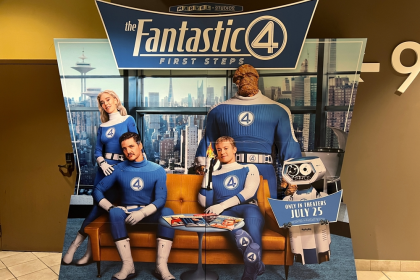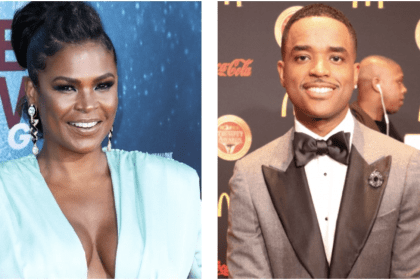In the heart of Harlem, just steps away from the historic Apollo Theater, John Canada Terrell now supervises shifts at the Marriott Hotel in the Victoria Theater. It’s a fitting location for a man whose career spans the evolution of Black cinema and theater in America. During our conversation at Rolling Out’s Star Studio, Terrell’s voice carries the weight of experience as he reflects on his journey from an aspiring actor to a respected figure in the industry. “I lived my dream,” he says with quiet conviction, a statement that resonates through the stories he shares of his remarkable career.
Breaking ground with Spike Lee
The year was 1986, when Terrell first crossed paths with a graduate student named Spike Lee through cinematographer Ernest Dickerson. This encounter would prove transformative, leading to Terrell’s role in “She’s Gotta Have It,” a film that would become a cornerstone of modern Black cinema. “Spike’s a real filmmaker, can’t take that away from him,” Terrell acknowledges, though he adds with characteristic frankness, “Whether or not he’s loyal to the people that came out the gate with him, that’s a whole other conversation.”
The impact of She’s Gotta Have It was immediate and profound, “I could not walk down the street,” Terrell recalls, describing the sudden recognition that came with the film’s success. The movie not only launched careers but also marked a significant shift in how Black stories were told on screen, presenting a vision of New York and Black life that audiences had never seen before.
From Negro Ensemble Company to Hollywood
Before his breakthrough in film, Terrell spent eight years attempting to join the prestigious Negro Ensemble Company (NEC), the premier Black theater company of its time. The artistic director’s rejection, which he now views as a blessing, forced him to develop alongside future luminaries. “How do you compete with Samuel, Denzel and everybody that came out?” he reflects. This period of growth included training at the British American Acting Academy, Roundabout Theater Conservatory, and the Actor’s Studio, where he studied alongside Al Pacino.
The rigorous theatrical training would prove invaluable throughout his career. “I was mentored in a way where I studied the craft, and I took it very seriously,” Terrell explains. His mother’s background as a teacher instilled in him a deep respect for education, even as his family initially disapproved of his acting ambitions. The rejection only strengthened his resolve to excel in his chosen field.
Cannes and international recognition
The journey to the Cannes Film Festival marked a pivotal moment in Terrell’s career, while other American stars stayed away due to terrorist threats, Terrell and his colleagues attended, representing not just their film but American cinema itself. “It was a hell of an experience,” he recalls. “Here I was in the Riviera, I thought I died and went to heaven.”
The festival provided more than just glamour and recognition. It offered Terrell a global perspective on filmmaking and the opportunity to interact with filmmakers from around the world. However, the experience wasn’t without its challenges. A confrontation at a South African film party revealed the persistent racial tensions of the era, with Terrell standing his ground against discrimination even in this prestigious setting.
The evolution of mentorship
Terrell’s education in the craft came from an impressive lineup of mentors, including his godfather, Gordon Parks, the pioneering director of Shaft. “I used to just bug other actors that were famous,” he admits with a laugh. “You can’t throw me off the set because my godfather is the director.” This early exposure to filmmaking under Parks’s guidance provided invaluable insights into the industry.
The mentorship tradition continues through Terrell’s own teaching career, including his five-year stint running an acting school in Philadelphia until COVID-19 forced its closure. His approach to teaching reflects his own journey, emphasizing practical experience over theory. “I teach what I do,” he states firmly, often pulling out his stack of industry checks to demonstrate to skeptical students the reality of his ongoing success in the field.
Legacy and influence
The impact of early influences like Ozzie Davis and Ruby Dee remains vivid in Terrell’s memory. He recalls seeing “Purlie Victorious” as a pre-teen, with Davis and Dee performing at an outdoor theater in Philadelphia. This experience, combined with later encounters with artists like Gil Scott Heron at Lincoln University, helped shape his understanding of the power of Black theater and storytelling.
His time at Lincoln University, an HBCU in Jefferson City, Mo., provided another crucial layer to his development. “I came out of that generation that was protesting,” he explains, connecting his artistic journey to the broader civil rights movement. The institution’s legacy of nurturing Black intellectuals, including luminaries like Langston Hughes, created an environment where artistic ambition could flourish alongside social consciousness.
A new chapter
Today, Terrell brings his wealth of experience to his new comedy where he plays a club owner navigating dangerous territory when old friends from his Woodstock days appear uninvited. The role exemplifies his continuing commitment to storytelling and character development, skills he honed through decades of performance.
Currently, he’s developing a screenplay about the Victoria Theater’s rich history, a project that promises to add another chapter to his legacy in Black entertainment. “If I were to die tomorrow my dream came true. I lived my dream,” Terrell reflects, though he’s far from finished. His story serves as a testament to the evolution of Black cinema and theater in America, while his ongoing work ensures that the next generation of performers will have a path to follow.
















